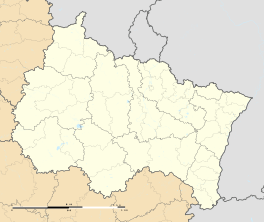Forbach
| Forbach-Boulay-Moselle | ||
|---|---|---|
|
Town centre | ||
| ||
 Forbach-Boulay-Moselle | ||
|
Location within Grand Est region  Forbach-Boulay-Moselle | ||
| Coordinates: 49°11′N 6°54′E / 49.19°N 6.90°ECoordinates: 49°11′N 6°54′E / 49.19°N 6.90°E | ||
| Country | France | |
| Region | Grand Est | |
| Department | Moselle | |
| Arrondissement | Forbach-Boulay-Moselle | |
| Canton | Forbach | |
| Intercommunality | Forbach-Boulay-Moselle Porte de France | |
| Government | ||
| • Mayor (2008–2014) | Laurent Kalinowski | |
| Area1 | 16.32 km2 (6.30 sq mi) | |
| Population (2011)2 | 21,954 | |
| • Density | 1,300/km2 (3,500/sq mi) | |
| Time zone | CET (UTC+1) | |
| • Summer (DST) | CEST (UTC+2) | |
| INSEE/Postal code | 57227 / 57600 | |
| Elevation |
192–388 m (630–1,273 ft) (avg. 222 m or 728 ft) | |
|
1 French Land Register data, which excludes lakes, ponds, glaciers > 1 km² (0.386 sq mi or 247 acres) and river estuaries. 2 Population without double counting: residents of multiple communes (e.g., students and military personnel) only counted once. | ||
Forbach (French pronunciation: [fɔʁbak], Lorraine Franconian: Fuerboch) is a commune in the department of Moselle in the northeastern French Region of Grand Est.
It is located on the German border approximately 15 minutes from the center of Saarbrücken, Germany, with which it constitutes a cross-border conurbation, and is part of the Saar-Moselle Eurodistrict. According to the 2011 national census, Forbach had a population of 21,954 inhabitants,[1] which, including its greater urban area, makes it the largest town in the eastern Moselle area.
Before the Schengen Treaty, Forbach was a major border crossing at which customs procedures were carried out, both for road and for rail transport and travel.[2] Here, trains also change track sides from right-hand running (Germany) to left-hand running (France). Since 2007, the TGV and ICE high speed trains connecting Paris and Frankfurt have stopped at the station in Forbach, and passengers can now travel to Paris Gare de l'Est in 1 hour and 45 minutes and to the German financial center and airport in the Frankfurt and Rhine-Main metropolis in 2 hours.
Its location in the Saar-Warndt coal mining basin,[3] which extends into eastern Moselle, made Forbach an important mining town, with offices of the Houillères du Bassin de Lorraine (Lorraine coal mining board), a section of the French Coal Board. When the mining operations were permanently shut down in 2004,[4] Forbach turned to activities in the tourism, service, energy and other industries to rebuild the local economy.[5] The "Musée des Mineurs - Wendel" in the neighboring village of Petite-Rosselle is a coal mining museum which preserves the industrial and cultural heritage from the coal mining era in the Forbach region. It was awarded the "Musées de France" quality label in 2002.[6]
Notable people from Forbach
- Nicolas Appert (1749–1841) inventor, notably of the canning technique
- Claire Burger, journalist, screenwriter and film director. Her 2008 short film, Forbach, was awarded by the Cinéfoundation in 2008[7] and she received the "Ensemble Prize" along with Marie Amachoukeli and Samuel Theis in the category "A Certain Regard" (Un Certain Regard) for their first feature film, Party Girl, at the 2014 Cannes Film Festival.[8]
- Helmut Fritz (born 1975), singer
- Jean-Nicolas Houchard (1740–1793), French General, whose name appears on the Arc de Triomphe in Paris
- Sophie Huber (born 1985), freestyle swimmer
- Eugene Jolas (1894-1952), journalist, poet and translator, best known for founding the modernist Parisian journal transition (which published, notably, James Joyce's "Finnegans Wake").
- Patricia Kaas, singer from Stiring-Wendel (near Forbach)
- Angelo Antonio Toriello (born 1962), activist, investigative journalist and diplomat currently serving as ambassador at-large of the Democratic Republic of Sao Tomé and Principe
- Christian von Zweibrücken (1782–1859), Bavarian general
See also
Gallery
- Town centre
 Catholic Church
Catholic Church
Notes
- ↑ "Insee - Populations lgales 2011 - 57227-Forbach".
- ↑ Assemblée Nationale de France, Compte-rendu des séances de l'Assemblée nationale législative. Tome Dix-Septième, du 4 novembre au 1 décembre 1851. Addition à la séance du jeudi 6 novembre 1851, p 23.
- ↑ This basin lies 44 km east of Longeville-les-Metz, under the Franco-German border extending into the Warndt region of Saarland in Germany.See map
- ↑ "France ends coal mining with tears but not a single protest". The Independent, April 24, 2004.
- ↑ Lorraine Regional Council: Territoires 2020: Moselle-Est. Synthèse des propositions issues du travail d'expérimentation, pp 17-25.
- ↑ List of French museums awarded the label of "Musées de France"
- ↑ "FORBACH". Festival de Cannes.
- ↑ "UN CERTAIN REGARD 2014 AWARDS". Festival de Cannes.
External links
| Wikimedia Commons has media related to Forbach. |
- Official website (French)
- Eurodistrict website (French)
- English website for the Musée les Mineurs-Wendel
